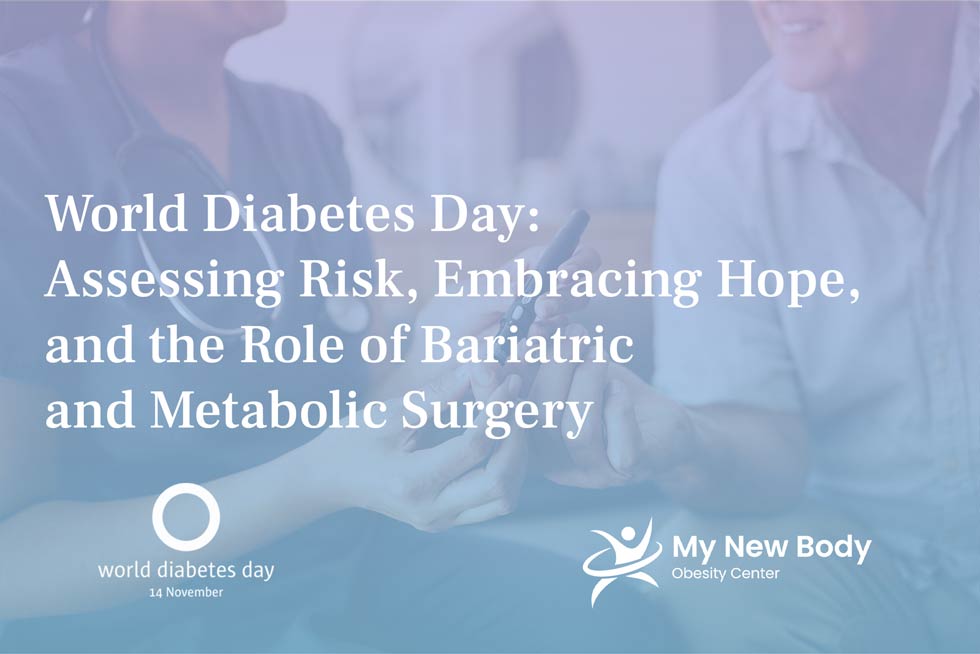Table of Contents
- Introduction
- Assessing Diabetes Risk:
- Bariatric and Metabolic Surgery: A Treatment for Diabetes
- Bariatric Surgery and Metabolic Surgery at My New Body Obesity Center
Introduction:
World Diabetes Day, observed on November 14th each year, serves as a global call to action to raise awareness about diabetes, its prevention, and the challenges faced by those living with the condition. In line with this year’s theme, “Know your risk, Know your response”, My New Body Obesity Center acknowledges the significance of not only understanding diabetes risk but also exploring innovative solutions, such as bariatric and metabolic surgery, to transform lives.
Assessing Diabetes Risk:
The International Diabetes Federation (IDF) has taken a significant step forward in diabetes prevention by creating an online diabetes risk assessment tool. This tool is designed to predict an individual’s risk of developing type 2 diabetes within the next ten years. It utilizes the Finnish Diabetes Risk Score (FINDRISC), a comprehensive assessment developed by Adj. Prof Jaana Lindstrom and Prof. Jaakko Tuomilehto from the National Institute for Health and Welfare in Helsinki, Finland.
The FINDRISC tool considers various factors, including age, BMI, waist circumference, physical activity, diet, family history, and history of high blood glucose. This holistic approach aims to provide individuals with valuable insights into their risk profile, empowering them to take proactive measures to prevent or manage diabetes.
Bariatric and Metabolic Surgery: A Treatment for Diabetes
For individuals already grappling with diabetes, especially those with obesity-related type 2 diabetes, bariatric and metabolic surgery emerges as a powerful and life-changing intervention. Research and clinical experience consistently demonstrate the significant positive impact of these surgeries on diabetes management.
-
- Weight Loss and Insulin Sensitivity: Bariatric surgery, such as gastric bypass and sleeve gastrectomy, often leads to substantial weight loss. This weight loss, coupled with metabolic changes induced by the surgery, enhances insulin sensitivity and improves blood sugar control.1
- Remission of Type 2 Diabetes: Numerous studies highlight the potential for complete remission of type 2 diabetes following bariatric surgery. The surgery’s influence on gut hormones, the microbiome, and metabolic pathways contributes to the reversal of diabetes in many patients.2
- Reduced Cardiovascular Risk: Beyond diabetes management, bariatric surgery has been associated with a reduction in cardiovascular risk factors, including hypertension and dyslipidemia. This comprehensive improvement in metabolic health contributes to an overall better quality of life.3
- Long-Term Benefits: Research suggests that the positive effects of bariatric and metabolic surgery on diabetes persist in the long term. Patients often experience sustained improvements, emphasizing the enduring impact of these surgical interventions.4
As we reflect on World Diabetes Day, it is essential to acknowledge the multifaceted approach required to tackle diabetes – from risk assessment and prevention to innovative treatments. My New Body Obesity Center stands committed to being a beacon of hope for those struggling with obesity-related diabetes.
Bariatric Surgery and Metabolic Surgery at My New Body Obesity Center
If you are concerned about your risk of developing diabetes or are already living with the condition, take proactive steps. Utilize the IDF’s online risk assessment tool to understand your risk profile and consider the transformative potential of bariatric and metabolic surgery.
Contact My New Body Obesity Center to explore personalized solutions tailored to your unique health needs. Our multidisciplinary team of experts in bariatric surgery is here to guide you on a journey towards a healthier, diabetes-free life. It’s not just about managing diabetes; it’s about embracing a future filled with vitality and well-being.
In conclusion, let World Diabetes Day be a catalyst for positive change. By assessing risk, embracing hope through innovative treatments like bariatric and metabolic surgery, and taking actionable steps, we can collectively work towards a world where diabetes is better understood, prevented, and effectively managed.
Together, let’s pave the way to a healthier tomorrow.
References
- Villarreal-Calderón, J. R., Cuéllar, R. X., Ramos-González, M. R., Rubio-Infante, N., Castillo, E. C., Elizondo-Montemayor, L., & García-Rivas, G. (2019). Interplay between the adaptive immune system and insulin resistance in weight loss induced by bariatric surgery. Oxidative medicine and cellular longevity, 2019.
- Wu, T., Wong, S. K. H., Law, B. T. T., Grieve, E., Wu, O., Tong, D. K. H., … & Wong, C. K. H. (2020). Five‐year effectiveness of bariatric surgery on disease remission, weight loss, and changes of metabolic parameters in obese patients with type 2 diabetes: a population‐based propensity score‐matched cohort study. Diabetes/Metabolism Research and Reviews, 36(3), e3236.
-
Kindel, T. L., & Strande, J. L. (2018). Bariatric surgery as a treatment for heart failure: review of the literature and potential mechanisms. Surgery for obesity and related diseases : official journal of the American Society for Bariatric Surgery, 14(1), 117–122. https://doi.org/10.1016/j.soard.2017.09.534
-
Shah, A., & Laferrère, B. (2017). Diabetes after Bariatric Surgery. Canadian journal of diabetes, 41(4), 401–406. https://doi.org/10.1016/j.jcjd.2016.12.009


